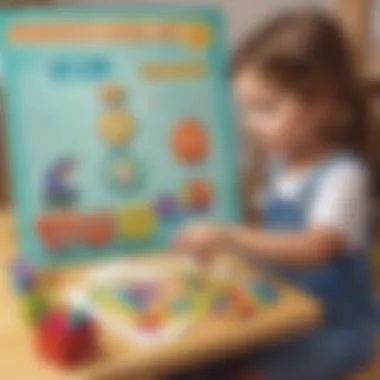Unlocking Kindergarten Potential: Engaging Math Worksheets for Young Minds


Fun Activities Ideas
Indoor Activities
Integrating indoor activities as part of kindergarten learning enhances cognitive development and fine motor skills in children. Activities such as number hunt where children search for numbers around the house, or sorting objects based on colors and shapes can reinforce addition skills in a fun and engaging manner.
Outdoor Adventures
Outdoor adventures offer valuable opportunities for experiential learning and exploration. Children can engage in activities like counting natural objects such as rocks or leaves, or playing outdoor games that incorporate addition, fostering a hands-on approach to learning math.
Arts and Crafts
Artistic expression through crafts not only nurtures creativity but also reinforces mathematical concepts. Crafting activities like creating shape collages or counting beads while making bracelets promote basic addition skills while igniting children's imagination.
Science Experiments
Integrating science experiments into kindergarten curriculum provides a hands-on approach to learning math. Activities like counting ingredients for a science project or measuring liquids for experiments not only enhance addition skills but also spark curiosity in young learners.
Cooking and Baking
Cooking and baking activities offer practical applications of addition skills in a real-world context. Involving children in measuring ingredients, following recipes, and counting cooking utensils not only strengthens their addition abilities but also instills a sense of accomplishment and independence.
Introduction
In this article, we explore the crucial role of adding worksheets in enhancing the mathematical skills of young learners in kindergarten. By delving into effective teaching strategies and interactive activities, both parents and educators can gain insights into creating a stimulating learning environment for preschoolers.
Welcome to Gigglyx - Your Ultimate Destination for Fun Kids' Activities!
Overview of Gigglyx
Gigglyx stands out as a premier platform offering a wide array of engaging activities tailored for children. From educational resources to entertaining games, Gigglyx prides itself on providing a holistic approach to children's development. Its commitment to fun and learning fusion makes it a go-to choice for parents and educators looking to enhance kindergarten learning experiences. The unique feature of Gigglyx lies in its ability to seamlessly blend entertainment with education, ensuring that young learners are engaged and motivated to explore the world of mathematics.
Target Audience


Gigglyx caters to a diverse group of children, parents, teachers, and guardians seeking high-quality educational content. The platform's target audience encompasses preschoolers, kindergarten learners, and even elementary school students, making it a versatile and inclusive resource for various age groups. The key characteristic of Gigglyx's target audience is its emphasis on tailored activities that cater to individual learning needs, ensuring that every child can benefit from the platform's offerings. The advantage of Gigglyx's target audience lies in its ability to provide personalized learning experiences, adapting to the unique preferences and abilities of each learner.
Understanding the Importance of Kindergarten Education
Kindergarten education forms the bedrock of a child's academic journey, laying the foundation for future learning and development. In this article, we delve deep into the crucial role that kindergarten education plays in shaping young minds. A key element in this exploration is how enhancing kindergarten learning through engaging adding worksheets can significantly impact a child's mathematical skills and overall cognitive growth.
Foundational Skills Development
Cognitive Growth
Cognitive growth in kindergarten education focuses on fostering a child's thinking abilities, problem-solving skills, and mental processes. It encourages children to explore, experiment, and engage in tasks that stimulate their brain development. The key characteristic of cognitive growth lies in enhancing a child's analytical thinking and logical reasoning skills, which are essential for academic success. This aspect is a popular choice for our article as it underscores the significance of promoting critical thinking and cognitive agility in young learners.
Cognitive growth offers a unique feature by encouraging children to approach learning tasks with creativity and curiosity, thus broadening their cognitive horizons. While the advantages of cognitive growth are evident in the enhanced problem-solving capabilities and adaptability of children, potential disadvantages may include challenges in transitioning to different learning styles. However, in the context of this article, cognitive growth emerges as a pivotal aspect in kindergarten education that contributes to a well-rounded academic experience.
Numeracy Skills
Numeracy skills play a vital role in building a strong mathematical foundation for kindergarteners. By focusing on numerical concepts, patterns, and relationships, numeracy skills aid children in developing a deeper understanding of mathematical principles. The key characteristic of numeracy skills is their emphasis on numerical fluency and problem-solving abilities, preparing children for more complex mathematical concepts in higher grades. This aspect is a beneficial choice for our article as it highlights the importance of instilling a solid grasp of numeracy early on.
Numeracy skills offer a unique feature by integrating mathematics into everyday experiences, making abstract concepts tangible and relatable for young learners. The advantages of numeracy skills include improved mathematical confidence and a greater ability to apply mathematical concepts in real-world situations. Potential disadvantages may involve challenges in transitioning from concrete to abstract mathematical thinking. However, within the context of our article, numeracy skills stand out as a fundamental component of kindergarten education that equips children with essential mathematical competencies.
Effective Teaching Strategies for Kindergarten Math
In the context of this article, 'Effective Teaching Strategies for Kindergarten Math' plays a pivotal role in shaping young learners' mathematical proficiency. By emphasizing tailored instructional methods, educators can adapt teaching approaches to meet the diverse needs of students at the foundational learning stage. Key elements such as employing interactive activities, fostering critical thinking skills, and incorporating hands-on experiences are essential components of effective teaching strategies for kindergarten math. These practices aim to enhance students' cognitive development, numeracy skills, and overall academic performance.
Utilizing Adding Worksheets
Interactive Learning Techniques
Interactive Learning Techniques introduce a dynamic approach to math education by engaging students actively in the learning process. By incorporating interactive elements such as games, puzzles, and digital platforms, educators can create a stimulating mathematical environment that cultivates a sense of curiosity and exploration among kindergarten students. The key characteristic of Interactive Learning Techniques lies in its ability to promote experiential learning, allowing young learners to grasp mathematical concepts through hands-on participation. This method fosters a deeper understanding of mathematical principles and encourages problem-solving skills in a interactive and engaging manner. While Interactive Learning Techniques offer a fun and immersive learning experience, educators must be mindful of balancing screen time and ensuring that digital activities complement traditional teaching methods effectively.
Hands-On Activities
Incorporating Hands-On Activities into kindergarten math curriculum enhances kinesthetic learning experiences for young students. Hands-On Activities involve physical manipulation of objects, such as counters, blocks, and measuring tools, to strengthen conceptual understanding and spatial reasoning skills. The key characteristic of Hands-On Activities is their ability to bridge the gap between abstract mathematical concepts and real-world applications, making learning more tangible and engaging for preschoolers. This approach empowers students to explore mathematical ideas through tactile experiences, promoting a deeper connection with mathematical concepts. While Hands-On Activities offer numerous benefits in promoting active learning and conceptual understanding, educators need to consider resource availability, supervision, and individual learning styles when implementing hands-on approaches in the classroom.
Creating Engaging Adding Worksheets for Kindergarteners


In this article, the focus shifts to the pivotal role played by Creating Engaging Adding Worksheets in enhancing the educational experience for kindergarteners. By delving into this topic, we aim to shed light on the specific elements, benefits, and considerations involved in crafting worksheets that resonate with young learners. Engaging Adding Worksheets serve as dynamic tools to stimulate young minds, fostering a love for learning and a solid foundation in math. The strategic design and implementation of these worksheets can significantly impact a child's cognitive development and numeracy skills.
Incorporating Visual Elements
Colorful Designs
Colorful Designs form an integral part of the Creating Engaging Adding Worksheets for Kindergarteners, serving as a visual feast for young learners. The vibrancy and liveliness inherent in colorful designs effortlessly capture children's attention, making the learning process more engaging and exciting. The key characteristic of colorful designs lies in their ability to evoke creativity and imagination, encouraging kids to explore math concepts in a playful manner. Choosing colorful designs for these worksheets proves to be a popular choice due to their ability to create a visually stimulating environment conducive to learning. The unique feature of colorful designs is their power to create a visually rich experience that aids in memory retention and concept comprehension. While colorful designs enhance the aesthetic appeal of the worksheets, careful consideration must be given to not overcrowd or distract students from the core learning objectives.
Illustrative Characters
Illustrative Characters bring a touch of personality and storytelling to the Adding Worksheets, enhancing the overall educational journey for kindergarteners. These characters play a pivotal role in making abstract mathematical concepts more relatable and accessible to young minds. The key characteristic of illustrative characters is their ability to add a narrative element, making learning more interactive and enjoyable for children. Their presence encourages emotional connections and provides a sense of familiarity, easing any apprehensions that children may have towards math. Choosing illustrative characters is a beneficial choice for this article as they create a sense of companionship and support throughout the learning process. The unique feature of illustrative characters is their capacity to simplify complex ideas and facilitate a deeper understanding of mathematical operations through storytelling. While illustrative characters enhance engagement and comprehension, it's essential to ensure they align with the educational objectives and do not overshadow the primary focus on mathematical skills.
Encouraging Parental Involvement in Kindergarten Learning
Parental Involvement in Kindergarten learning plays a crucial role in a child's educational journey. It is not just about dropping off children at school but actively participating in their learning process. By engaging parents, educators can create a holistic learning environment that bridges the gap between home and school. Parents become vital partners in shaping a child's academic and social development.
Encouraging parental involvement benefits students by fostering a strong support system and enhancing their overall learning experience. It strengthens the parent-child bond, instills a sense of accountability, and boosts children's self-esteem and confidence. When parents participate in learning activities, children are more likely to excel academically and display improved behavior at school. Additionally, involving parents in kindergarten education allows for a better alignment between classroom instruction and home-reinforcement, leading to a more cohesive learning experience for the child.
Considerations about encouraging parental involvement in kindergarten learning include understanding diverse family dynamics and cultural backgrounds. Educators need to communicate effectively with parents, respecting their perspectives and involving them in decision-making processes. Creating a welcoming and inclusive school environment is essential to encourage parents to actively engage in their child's education. By fostering a partnership approach between school and home, educators can leverage the strengths of both to support the child's growth and development.
Family Math Games
Family math games serve as an interactive and enjoyable way to reinforce math concepts learned in kindergarten. These games promote family bonding while enhancing mathematical skills in young learners. The key characteristic of family math games is their ability to make learning fun and engaging for children. By incorporating elements of play into mathematical activities, children develop a positive attitude towards math, boosting their confidence and interest in the subject.
Family math games are a popular choice for this article due to their versatility and accessibility. They can be easily adapted to suit different age groups and math levels, making them a beneficial tool for enhancing kindergarten learning. The unique feature of family math games lies in their ability to turn mundane math exercises into exciting challenges that encourage active participation and critical thinking. This approach not only makes learning enjoyable but also reinforces problem-solving skills in young learners.
Daily Math Challenges
Daily math challenges provide a structured way to reinforce math concepts on a regular basis. These challenges encourage consistency and practice, enabling children to develop a strong foundation in mathematics. The key characteristic of daily math challenges is their focus on applying math skills in everyday situations, making learning relevant and practical for students. By incorporating daily challenges into the learning routine, children develop a habit of thinking mathematically and problem-solving on a daily basis.
Daily math challenges are a beneficial choice for this article as they promote continuous learning and skill development. They offer a quick and interactive way to engage children with math outside of the classroom, maintaining their interest and motivation. The unique feature of daily math challenges is their ability to instill a sense of achievement and progress in children as they tackle new problems each day. This helps build confidence and resilience in young learners, preparing them for future mathematical challenges.
Implementing Technology in Kindergarten Math Education
In the landscape of kindergarten education, the implementation of technology plays a pivotal role in enhancing math learning experiences for young students. Integrating technology in early childhood education not only caters to the digital era children are growing up in but also offers numerous benefits in promoting math skills.


One essential element to consider when implementing technology in kindergarten math education is accessibility. By making educational technology readily available in classrooms, educators can engage students in interactive learning experiences that cater to diverse learning styles. Additionally, incorporating technology allows for personalized learning experiences, where students can progress at their own pace, reinforcing foundational math concepts.
Moreover, the inclusion of technology in math education provides a dynamic platform for hands-on learning. Interactive tools and educational software can transform abstract math concepts into tangible activities, fostering a deeper understanding of mathematical principles among kindergarteners.
Assessing the impact of technology in early math education involves considering the integration of digital resources that align with curriculum objectives while enhancing the overall learning process. By carefully selecting and integrating technology, educators can create a stimulating math learning environment that encourages exploration and critical thinking.
Digital Resources for Math Enrichment
Educational Apps
Educational apps stand as a cornerstone in the realm of digital resources for math enrichment, offering engaging platforms for young learners to enhance their math skills. The specificity and focus of educational apps on math concepts provide targeted support for kindergarteners in building numeracy skills.
A key characteristic of educational apps lies in their interactive and visually appealing nature, making learning math concepts enjoyable and accessible for children. Through gamified experiences and interactive challenges, educational apps effectively capture children's attention and sustain their engagement in math activities.
One unique feature of educational apps is their adaptability to individual learning levels, allowing students to progress at their own pace while receiving immediate feedback on their math proficiency. This personalized approach enhances the effectiveness of math learning and ensures continuous improvement.
Despite these advantages, educational apps also present some limitations. Overexposure to screen time and potential distractions can be drawbacks of excessive app usage. Therefore, educators and parents must monitor and regulate children's usage to ensure a balanced approach to learning.
Online Math Platforms
Online math platforms emerge as versatile tools for math enrichment in kindergarten education, facilitating access to a wide array of resources and activities to support mathematical learning. The key characteristic of online math platforms lies in their comprehensive approach to math education, offering varied content to cater to diverse learning needs.
Online math platforms are a beneficial choice for this article due to their interactive nature, providing a mix of instructional videos, games, and practice exercises that reinforce math concepts in an engaging manner. By incorporating visual aids and interactive features, these platforms create an immersive learning experience for young learners.
A unique feature of online math platforms is their ability to track student progress and provide real-time feedback, enabling educators to monitor individual performance and offer targeted support where needed. This data-driven approach enhances the effectiveness of teaching and allows for personalized interventions.
While online math platforms offer many advantages, potential disadvantages include the need for internet connectivity and digital literacy. Educators may need to ensure access to these platforms and provide guidance on navigating online resources effectively to optimize learning outcomes.
Conclusion
The Conclusion section of this article encapsulates the importance of utilizing engaging adding worksheets in enhancing kindergarten learning effectively. By delving into the significance of this topic, readers can grasp the pivotal role that interactive math tools play in fostering young learners' mathematical skills. With a focus on creating a dynamic and stimulating educational environment, incorporating adding worksheets can offer numerous benefits. It not only helps children develop essential numeracy skills but also cultivates their cognitive growth through hands-on activities and interactive learning techniques. The Conclusion serves as a pivotal point in emphasizing the transformative impact of incorporating adding worksheets in kindergarten education.
Empowering Kindergarteners through Math Exploration
Key Takeaways
The section on Key Takeaways offers a detailed examination of the specific aspects that make this educational approach valuable. By discussing key characteristics, advantages, and considering potential drawbacks, readers can gain a comprehensive understanding of the benefits of utilizing this method. Key Takeaways highlight the interactive nature of adding worksheets, which fosters active engagement and participation among young learners. This aspect not only enhances mathematical skills but also promotes critical thinking and problem-solving abilities. The unique feature of Key Takeaways lies in their ability to cater to different learning styles, making them a versatile and effective choice for kindergarten education. Despite some limitations in terms of individualized learning needs, the advantages of Key Takeaways outweigh the drawbacks in providing a well-rounded math exploration experience.
Future Perspectives
The Future Perspectives section delves into the evolving landscape of kindergarten math education and its relevance to the overall goal of empowering young learners. By shining a light on key characteristics and benefits, readers can appreciate the forward-thinking aspect of this educational outlook. Future Perspectives emphasize the adaptability and scalability of adding worksheets in meeting the changing needs of modern education. This approach ensures that children are equipped with the necessary skills to navigate an increasingly complex and tech-driven world. The unique feature of Future Perspectives lies in their ability to integrate technology and innovation seamlessly into math exploration, preparing children for future success. While some challenges may arise in terms of implementation and adoption, the advantages of Future Perspectives in enhancing kindergarten learning are evident, pointing towards a promising trajectory in early childhood education.



